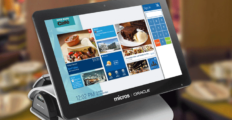Modern trends at most, if not all, industries require a data-driven approach to compete with other businesses. That means you need an efficient workflow when managing all aspects of your operation. And, an integral part of that is your leads and customers. Successfully collecting information about your customers allows you to understand them more. In turn, you can improve your products and services based on their demands. Additionally, this improves your sales and marketing efforts as well. How do you do this efficiently?
Customer relationship management (CRM) software will allow you to accomplish various customer-related tasks, and more. In this article, we will examine what CRM and related processes are. We will also take a look at why it is considered a must-have for any business. Also, we will show popular CRM platforms in the market today.

What is CRM Process Table of Contents
In today’s largely digitally-enabled markets, one cannot conduct proper customer relationship management (CRM) without digital tools. This is why in a January 2020 study, it was found that investing in CRM tools is the top investment priority of registered investment advisors in the US. With 43% of the votes, it is tied with performance reporting software.
Source: TD Ameritrade, 2020
This is quite a reflection of the fact that CRM today is deeply tied up with business performance. In fact, recent CRM statistics show that:
- Using CRM platforms may increase conversion rates up to 300%
- Customers are more likely to spend 20% to 40% more when engaged with a company using CRM
- CRM platforms can improve retention rates. This translates to an increase in profit by 25% to 85%
With its digital roots in the 1980s, CRM systems have come far from their original form: database marketing and automated contact tracking. And, as new technology and business frameworks evolve, CRM also evolves with it. In this article, we will get to know the CRM process better.
1. What is CRM process?
Customer relationship management (CRM) involves all processes to capture customers and maintain a relationship with them. Other processes include the management of customer data, information analysis, and generating reports to gain insights. CRM covers all aspects of the business operation that involves customers such as sales, business development, sales, marketing, and customer service.
Therefore, CRM tools are integral in storing information and executing these processes. They also help facilitate other procedures such as integration with other business workflows. These solutions centralize many operations that allow you and your team to manage marketing campaigns, create sales strategies, identify opportunities, minimize risks, and more.
2. Why is CRM Important?
As anyone who is into business knows, the customer is king. You would want them to get the best experience when buying your products or availing of your services. But you can only do that if you have enough relevant information about them – their tastes, their needs and wants, their purchasing bias and partiality. Giving an optimal customer experience is not without cost. This is why it is important that you put in place an efficient system or process that will provide a positive experience to customers and which will result in business growth and profitability. You will find later on that the benefits and returns will far outweigh the investments you poured into building customer relations.
If you think a CRM system is only for large businesses, now is the time to shatter that myth. A CRM is a significant tool whether you are a freelancer, sole entrepreneur, startup, or global corporation. The reasons why a CRM system matters much for a business are far too many if we list down specifics and details. For this section, we go for the big picture. Here are some of them:
- Discover – by uncovering useful insights and information about your customers; you are in the position to understand them better – who they are, how, and why they buy your products. Identifying and unraveling customer trends and interactions are crucial not only because you can readily anticipate their needs and address their issues but also keep you ahead of competitors who may not be as attuned as you are to customers’ pulse.
- Organize – you have the ways and means to keep everything in order – from the whole customer life cycle to customer channel engagement, from sales process automation to marketing campaigns, and from business analytics to storing and accessing customer data, among others. An otherwise string of complex situations and convoluted processes are all streamlined and automated to give you a clearer perspective and solid grasp of things.
- Optimize – you can improve, build, and manage customer-related operations through a host of CRM tools. These are designed to give you the flexibility and convenience you need to be responsive to your customers and at the same time, make it easy for customers to do business with you.
3. What Are the Types of CRM?
1. Operational. This type of CRM is for lead generation and conversion. It integrates and automates sales, marketing, and service support. Hence information on a customer typically includes past sales, previous marketing efforts, service issues (if any), and others. Operational CRM consists of sales automation, marketing automation, and service automation.
- Sales force automation – helps to automate the sales process in all the stages of a sales cycle to set a standard to gain new customers and handle existing ones. It analyzes sales promotion, automates tracking of client account history, and coordinates sales, marketing, call centers, and retail outlets.
- Marketing Automation – focuses on facilitating the marketing process to make it more efficient and effective. It automates repeated tasks, such as sending marketing emails or posting marketing information on various channels of engagement. Its goal is to find out the best way to offer products and approach potential customers to convert a sales lead into a full customer.
- Service automation – allows businesses to retain customers by providing the best quality service. It covers service automation of customer support, which includes issue management, customer call management (for incoming/outgoing calls), and service quality management based on KPIs.
2. Analytical. Its main function is to analyze customer data collected through multiple sources to help top management, marketing, sales, and support departments get better insights on how to improve customer service and experience. This CRM type employs data mining, pattern recognition and correlation techniques to analyze customer data and help key corporate people in the making of informed decisions, determining campaign effectiveness, and improving sales support.
3. Collaborative. As the term implies, this type enables a business organization to share customers’ information with external stakeholders such as vendors, suppliers, and distributors so that they would be on the same page with various business units like the sales team, marketing team, and technical and support team. Uniting all these groups through common customer information allows for the crafting of more effective, customer-specific, targeted campaigns.
4. What Are the Benefits of CRM?
Modern businesses operate on information and technology-driven, ultra-competitive market, and implementing a robust CRM system is as critical as ever. Without CRM, you are likely missing on the following benefits:
- Enhanced efficiency. A CRM can automate, streamline, and fast track workflows and tasks aside from organizing data, documents, and reports. Also, CRM systems are designed to integrate with a wide array of business and office platforms to give you superior flexibility. All these are meant to ensure that concerned personnel and teams operate at maximum efficiency and produce optimum results.
- Improved collaboration. Current cloud-based CRM platforms bring a distinct technological and practical advantage over on-premise software – anytime, anywhere accessibility. This capability enables the sharing of data and information as well as collaboration on tasks and workflows, unhindered by time and location.
- Increased customer engagement. A CRM is one of the proven means to increase positive customer experience and interaction since it can track a company’s relationship with customers on all “touch points” – company website, email, phone, live chat, tickets, physical or online store. CRM makes your business customer-focused and responsive, resulting in greater customer retention and conversion of prospects.
- Better accountability. With streamlined workflows and communication among concerned teams and employees, they are well aware of their roles and understand when they commit missteps. Correcting and avoiding these earn notches for the company when it comes to accountability and instilling values. A CRM can easily identify areas in customer relationships that have fallen short and can pinpoint the employees responsible for it. This allows the company to put corrective measures and respond accordingly.
- Data availability. CRM puts data on the spotlight as your most prized strategic asset. Integrated CRM systems have tools to collect, analyze, and make sense of data from your customers and prospects so that you can extract insights to improve your services and offerings. Understanding what data is all about, processing them to filter useful patterns and indicators, and making them readily available to you. Your employees will serve as a guide in providing exceptional services that you want for your customers.
If you want to learn more about how companies choose the right CRM solution, read our other post about this topic.
5. What Are Common Features of CRM Software?
Today’s CRM software is an integrated platform of various functions and capabilities. They typically carry the following features:
- Sales automation – Also referred to as sales force automation, this sales management feature is intended to prevent duplicate efforts between a salesperson and a customer by automatically tracking all follow-ups and contact by both sides.
- Marketing automation – Together with sales automation, they comprise the major component of CRM software. This automates repetitive tasks to facilitate marketing efforts to customers at different stages of the lifecycle.
- Contact center automation – Meant to simplify customer service processes and lessen the load of a contact center agent when assisting in customer problem-solving and information dissemination.
- Contact manager – Categorizes contacts, such as customers and suppliers, for easier sorting or retrieval. Although commonly integrated with other modules in a CRM software package, some vendors offer this as a stand-alone module for small businesses on a tight budget.
- Sales tracking – A feature that is usually part of sales automation but can be availed as a separate module. This feature measures and tracks sales so you can get an overview of sales performance both of your products and sales personnel.
- Analytics and reporting – Provides you with useful insights and information from all the collected data on customers, sales, marketing, leads, and others. It produces reports usually on ready-made templates.
- Communication channels – This feature enables communication with customers on multiple channels, including email, instant messaging, phone, live chat, forums, and social networks.
- Mobile – Most CRM software have mobile apps with basic features to enable access and uploading of reports, customer information, and other data at any time and from any location.
6. What Are the Best CRM Tools?
CRM is now the leading software category, which is proof of its usefulness and relevance to businesses. The use of cloud technology to host SaaS platforms has further ramped up its appeal by providing never before heard flexibility, scalability, and affordability. Vendors offer CRM tools either as complete, all-in-one packages or as separate, feature-specific modules. They can be cloud-hosted or deployed on-premise. There are several popular CRM software tools available in the market, and in some cases, you will even be able to get a CRM software for free. Here are some of them:
Hubspot CRM
HubSpot is a popular brand of business processing platform with a specialization in sales and marketing. HubSpot CRM is their take on customer management. This free platform is a smart and easy option without a complicated workflow. This means you can easily integrate the CRM with your current processes without disrupting your operations. It is easy to connect all your sales channels in HubSpot CRM, including your email service provider, social media profiles, websites, phone lines, and more. The software also connects seamlessly with many other business applications such as BigCommerce, Gravity Forms, SnapEngage, and more. You can store and manage up to a million contacts, leads, and users right in one place.
Furthermore, HubSpot CRM can handle various uses cases and business types such as startups, B2B, and B2C enterprises. It is also industry-independent, which means you can use it for different market types such as retail, construction, accounting, real estate, and more. This makes HubSpot CRM one of the most flexible and powerful business solutions out there.
Pipedrive
Pipedrive is currently one of the leading CRM solutions in the market and rightly so. The platform was developed by sales experts, which means it is customized to maximize sales potential. Its efficient sales management tool helps your team pick the right deals and activities to focus on. Sales pipeline and methodologies are built-in system and acts as your personal sales manager.
The platform also allows you to act quickly in closing deals using its intuitive system. You can easily identify hot deals and develop a personalized approach without wasting too much time. Pipedrive allows you to customize most of its modules to fit your processes. You can enable or disable entire modules without affecting your operations. You can also view statistics and reporting for a big picture view of your revenue, losses, and current activities.
Salesforce
Salesforce is another award-winning name in solution categories such as marketing, analytics, community cloud, and more. Salesforce CRM is one of their more popular platforms with its innovative approach to customer and sales management. It maximizes your revenue potential by automating many repetitive tasks so your sales team can focus on critical and high-potential leads.
The platform also supports mobile devices, so your sales team can work even on the field. The Salesforce CRM mobile app is updated with real-time data and analytics that give you an edge over the competition. You can also generate reports in just a few clicks, so you are always ready to take advantage of possibilities while minimizing risks. The platform also works well with other software like Zendesk, FinancialForce ERP, LeadExec, and much more.
Netsuite
NetSuite CRM was developed by Oracle, one of the most powerful technology brands in the world. The platform provides a complete solution that combines traditional and innovative processes in managing, storing, and processing your customers’ data. The robust contact management feature puts your sales teams and other departments within reach. You can easily assign personnel to various clients based on the customer journey. By pairing the right staff with each customer, you’ll have the best possible sales outcome.
The application automates many data collection tasks so your team can focus on creating sales strategies. This smart solution also tracks all customer activities on your website and stores them in the system. You can readily see which leads are highly likely to make the sale. You can also take advantage of its real-time forecasts, so you are always a step ahead of the competition.
monday.com
monday.com CRM is a leading collaboration software that can integrate teams from different departments; thus it also becomes an all-in-one digital workspace. The platform is ideal for connecting marketing, sales, and even freelancers, contractors, or clients that your teams need to collaborate with on a project. monday.com is packed with modern features and tools to make project management, customer service, marketing, human resource management, and IT management more efficient. With all your teams seamlessly connected into a single communication platform, you can increase work productivity and provide better service to clients.
monday.com lets you build your ideal CRM using highly customizable and ready-made templates. These templates work for any sales pipeline, process, or workflow you might need for your business. The dashboard and controls are easy to use with drag-and-drop interface and automation functionalities. You can manage sales and marketing activities like lead capturing, contact management, and customer onboarding.”
CRM Creatio
CRM Creatio is an out-of-the-box solution for ensuring more efficient CRM and business process automation for businesses of all sizes. As a comprehensive CRM platform, CRM Creatio comes with three modules: Marketing Creatio, Sales Creatio, and Service Creatio.
Each module comes with its own unique, specialized tools that can help teams involved in marketing and CRM campaigns. For instance, Marketing Creatio provides best-practice processes for the entire lead management process, from generation to nurturing. Sales Creatio comes with built-in features for managing orders and invoices as well as tracking sales performance.
Meanwhile, Service Creatio offers features for maintaining omnichannel communications with customers. The platform allows users to build a unified case database, so all cases from customers and users are collected in one system.
All these features provide users with a 360-degree view of customers. The unified database allows for complete visibility over customer information, including contact data, addresses, service history, and social media profiles. These capabilities make it easier for agents to improve customer service levels.
Freshsales
Freshsales is a full featured CRM solution that can help businesses automate their entire sales cycles. With its many advanced tools such as automated sales campaigns and contact management, Freshsales is able to provide a 360-degree view of contacts and make it easier to build client relationships.
Freshsales also implements an AI-based contact scoring feature, which allows salespeople to pinpoint their hottest leads. This AI scoring is based on factors like customer activities and past engagements. With this data, you can send personalized outreach and close deals faster. All follow-ups and engagements can also be done inside the CRM platform, so you can interact with customers with full context and deliver their requests much faster with fewer errors or miscommunication.
Zoho CRM
Zoho CRM is a well-known CRM software that offers both general-purpose and vertical solutions in one platform. It includes features and tools that allow users to customize their own CRM interface without using a single line of code. This enables a personalized interface fit for your specific business needs. Since Zoho is very flexible and easy to use, businesses can experience much faster roll out of their CRM, higher adoption, and better ROI.
Zoho CRM includes omnichannel capabilities so businesses can reach their customers in all touchpoints. These include email, social media, live chat, telephony, and web conferencing. The platform also has automation features like workflow rules and auto email follow-ups that can help sales teams focus less on admin tasks and more on selling activities.
Why should you adopt a CRM system?
By now, you probably have a deeper understanding of what is CRM process. As you may have learned, there are many benefits and advantages to having a CRM system in place. It puts in order the chaos and clutter that are results of normal business interactions, giving you the time to prioritize your customers. It gives you a database of customer information that is safely stored and can easily be accessed when needed.
Furthermore, a CRM tool gives you the means to analyze, track, and forecast sales. It provides you a 360-degree view of the customer from different data sets that have been consolidated and organized. In short, the platform is a productivity booster and revenue enhancer.
This is provided that it is used well and with the right framework. So, it is best to be updated with the latest CRM trends and best practices.

























Leave a comment!